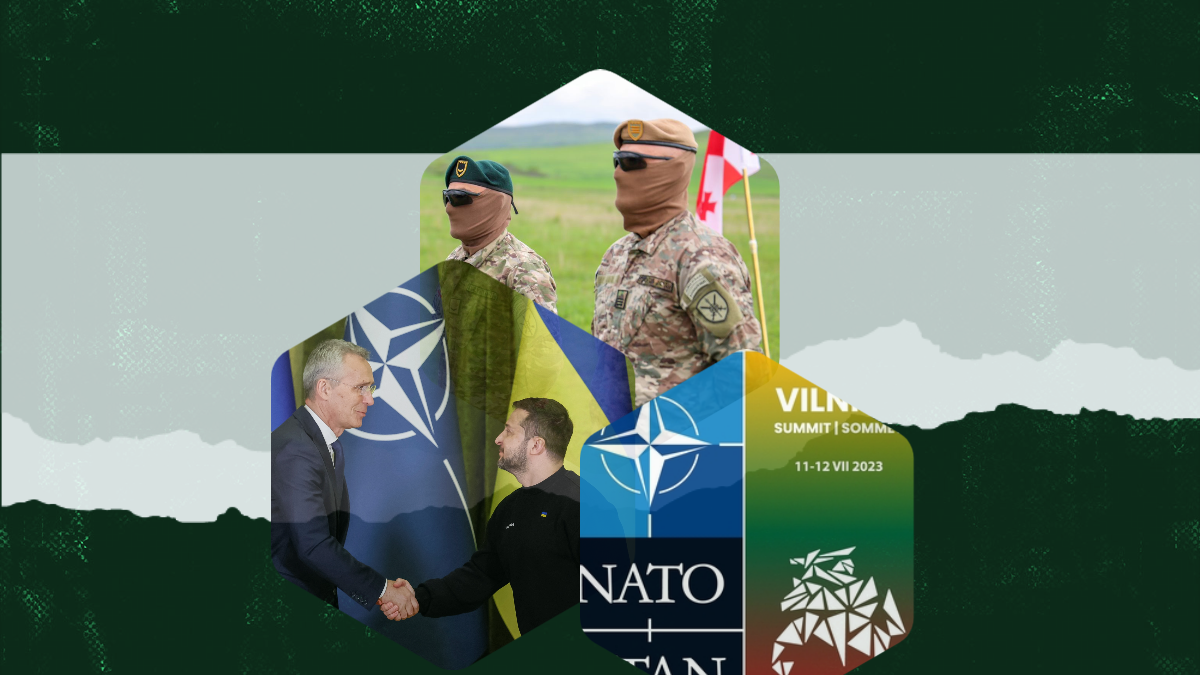The further enlargement of the NATO and the creation of sustainable security guarantees in Eastern Europe depend to a large extent on the outcome of the Russian-Ukrainian war, and the efforts of Ukraine, as the main actor in this process, will be aimed at a timely and successful end to the ongoing war.
About the Author: Amb. Levan Dolidze is the former Head of the Mission of Georgia to NATO (2013-2015) and Founder of the Georgia Center for Security and Development
In the light of current challenges, it is important that the Alliance takes steps to remove the Membership Action Plan (MAP) from the agenda, as the next stage in the accession for Georgia’s and Ukraine, at NATO’s Vilnius Summit in July, and that it strengthens the defense and security capabilities of these countries.
Two components of MAP
In 2008 in Bucharest, Georgia and Ukraine pledged to become members of the Alliance. At that Summit, the MAP was identified as the next stage in their integration.
However, as a result of the steps NATO has taken since then, the importance of MAP for these countries has taken on two dimensions: practical and political. The Alliance has progressively provided Georgia with all the practical tools to prepare for membership, and for the time being the MAP decision has retained purely political significance.
In December 2008, NATO initiated for Georgia and Ukraine virtually all of the instruments that would normally follow the granting of a MAP: NATO-Georgia and NATO-Ukraine Commissions were established, and Annual National Programs were launched. In 2014, after Georgia successfully passed the 2012 Chicago Summit Allies’ test for parliamentary elections, Georgia was granted the Substantial NATO-Georgia Package (SNGP), which entailed the establishment of a NATO-Georgia Joint Training and Evaluation Center (JTEC), an intensification of military exercises, and envisaged other key elements to prepare Georgia for NATO membership.
The 2014 Wales Summit Declaration stated: „Georgia’s relationship with the Alliance contains the tools necessary to continue moving Georgia forward towards eventual membership“.
The 2016 NATO Summit Declaration made it even clearer that the MAP retained only a political component. On the one hand, the Alliance noted: „Georgia will become a member of NATO with MAP as an integral part of the process “. On the other hand, the same document read: „Georgia’s relationship with the Alliance contains all the practical tools to prepare for eventual membership “.
Among the steps NATO has taken vis-à-vis Georgia at various times, it is also worth noting Georgia’s inclusion in the Enhanced Opportunity Partners’ (EOP) format and the Alliance’s decision to provide Tailored Support to Georgia, primarily in response to the changed security environment resulting from the Russia-Ukraine war. These steps provided an additional basis for enhancing NATO compatibility and strengthening defense capabilities.
Changed Circumstances
By inviting Sweden and Finland into NATO without a MAP, NATO has set a precedent for shortening the accession path. Of course, it is impossible to deny the context that distinguishes Sweden and Finland from the countries in the process of integration with NATO (Georgia, Ukraine, Bosnia-Herzegovina) – the EU membership, an exceptionally high level of military compatibility, and the geopolitical environment.
However, the decisions taken over the years to prepare Georgia for membership, including the new instruments created for this purpose (SNGP), have made it possible to accomplish all the tasks for which the MAP was created as an accession mechanism.
In ongoing discussions in professional circles, there is widespread agreement that, from a practical point of view, Georgia has sufficient NATO membership tools at its disposal. In Brussels and in the capitals of the Alliance member countries, frequently an emphasis had been made on the lack of precedent for NATO membership without the MAP. However, the invitation of Finland and Sweden has neutralized this argument.
Those members of the Alliance who were particularly reluctant to take decisions on Georgia or Ukraine are now taking unprecedented steps in support of Ukraine against the Russian aggression. The clearest example of this is the regular provision of military assistance to Ukraine.
What can be done?
However, given the critical situation in the region today, it is less likely that the Alliance will take drastic steps to enlarge eastwards. It is more likely that NATO will once again seek to build consensus around measured decisions.
Of course, the Alliance has to take into account the most difficult security environment and the additional risks created by the Russia-Ukraine war, but at the same time, it is important that the Vilnius Summit sends the right message to those countries whose citizens have for many years unwaveringly supported the European and Euro-Atlantic aspirations of their states and have paid high political price for progress along this path.
In light of the above arguments, it is important for NATO to take a step to remove MAP from the agenda as the next step in the accession process of Georgia and Ukraine at NATO Vilnius Summit in July. Towards this end:
- NATO should develop a special package to strengthen Ukraine’s defense capabilities, which will at the same time have the status of preparatory package for membership, as was the case with Georgia;
- The Summit Declaration should reaffirm the political decision of the Bucharest Summit on the accession of Georgia and Ukraine, without mentioning MAP as the necessary next stage of integration. The Declaration should also state that Georgia and Ukraine have all the necessary tools (not to mention the “practical” ones) to prepare for NATO membership;
- The Substantial NATO-Georgia Package (SNGP) should include elements that will significantly strengthen Georgia’s defense capabilities while significantly increasing the compatibility of the Georgian armed forces with NATO;
- Georgia and Ukraine should be given the opportunity to participate as fully as possible in NATO’s strategic discussions, including through regular attendance at meetings of the North Atlantic Council.
This post is also available in: ქართული
